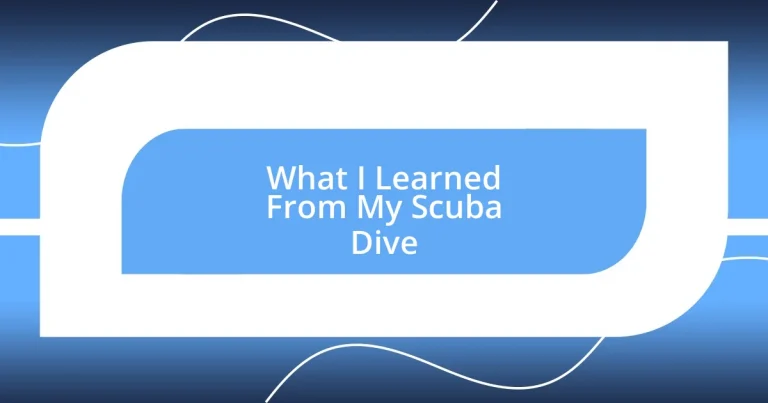Key takeaways:
- Scuba diving offers a unique opportunity to connect with nature, fostering patience and awareness while promoting mental relaxation from daily stresses.
- Key skills learned include effective communication through non-verbal cues, breath control for mindfulness, and a respect for ocean conservation.
- Preparation for emergencies is crucial; stay calm, signal for help, and practice drills to enhance safety and teamwork while diving.
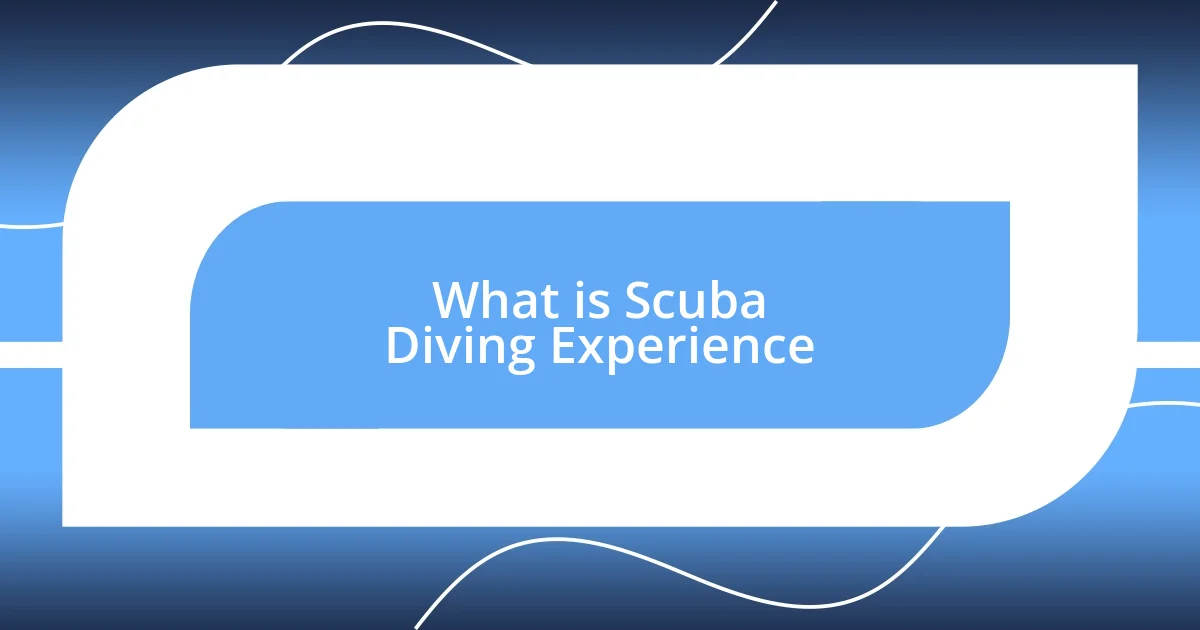
What is Scuba Diving Experience
Scuba diving is not just an activity; it’s a profound experience that immerses you in a different world beneath the waves. I still remember my first descent; the thrill of stepping off the boat, the water enveloping me, and the moment when the surface became a distant memory. Isn’t it amazing how quiet everything feels underwater? That serene silence is a stark contrast to our often noisy lives.
The underwater landscape reveals a vibrant ecosystem teeming with life. I was mesmerized by the intricate patterns on the coral and the unexpected burst of colors from fish darting past. Every dive feels like unwrapping a gift with countless surprises; have you ever watched a sea turtle glide gracefully by? It’s as if time stands still, offering a chance to connect with nature on a profound level.
Navigating through the depths also taught me valuable lessons about patience and awareness. As I floated among schools of fish, I realized how much I rush through life above water. The experience compelled me to slow down and embrace the moment. Isn’t it refreshing to shed the weight of our day-to-day worries, even for a little while? Every dive challenges me to appreciate the beauty around and within, creating lasting memories that I cherish.
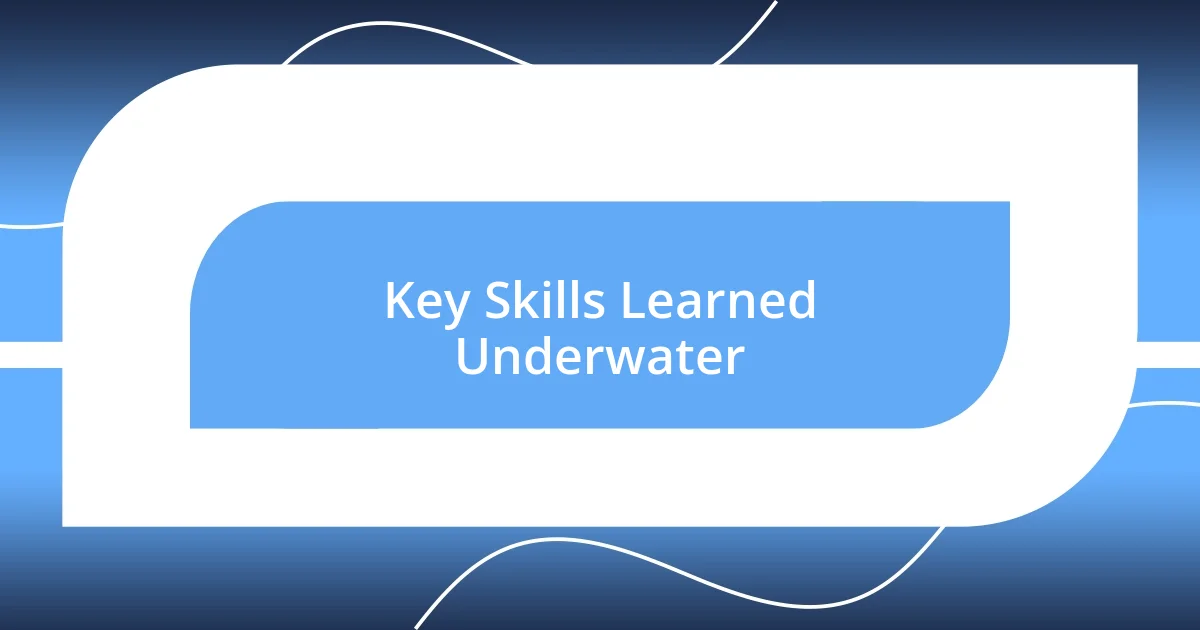
Key Skills Learned Underwater
Experiencing scuba diving taught me key skills that extend beyond just the technical aspects. One of the most important skills I picked up was effective communication underwater. Whether it’s through hand signals or a simple gesture, I learned how to convey thoughts and feelings without uttering a single word. I think this newfound ability fostered a deeper connection with my dive buddy, emphasizing trust and teamwork in an environment where verbal conversations can’t happen.
Breath control became a revelation for me. I vividly remember my first dive when I felt anxious and started to panic, leading to quick, shallow breaths. By focusing on my breathing patterns, I was able to calm myself down, which not only enriched my diving experience but also improved my overall mindfulness. This skill translates wonderfully into daily life, reminding me to take a moment and breathe deeply whenever stress creeps in.
Finally, I learned a profound respect for the underwater environment. As I glided over a coral reef for the first time, I felt like an uninvited guest in a bustling community. Witnessing the delicate interplay of life forms made me realize how crucial it is to protect these ecosystems. Every dive has instilled in me a responsibility to advocate for our oceans; it’s a lesson I carry with me everywhere, urging me to contribute to preservation efforts above the water.
| Skill | Description |
|---|---|
| Effective Communication | Using hand signals and gestures to convey messages without speaking. |
| Breath Control | Learning to manage breathing patterns to enhance relaxation and mindfulness. |
| Environmental Respect | Cultivating awareness and responsibility for ocean conservation and ecosystems. |
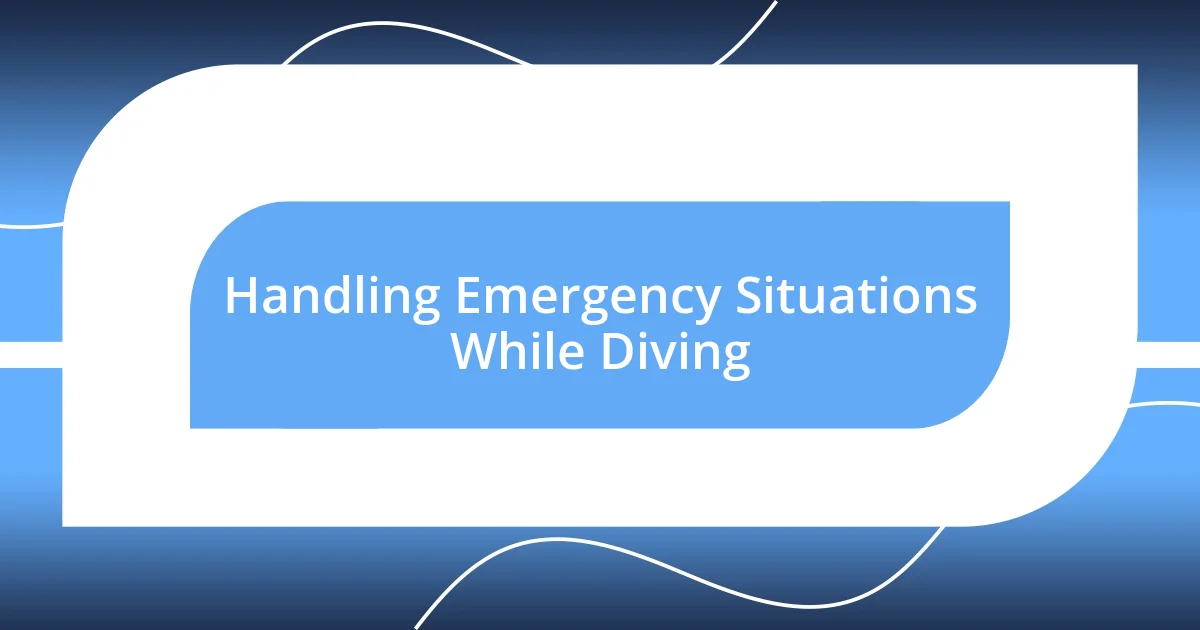
Handling Emergency Situations While Diving
Diving comes with its share of surprises, and some of those surprises can be a bit alarming. I once found myself unexpectedly drifting into a current that pulled me away from my dive group. The initial rush of panic was palpable; my heart raced, and I felt a sense of isolation. I quickly recalled my training: stay calm, monitor my air supply, and signal to my buddy. That experience taught me that remaining composed is crucial, as the choices made in moments of distress can determine the dive’s outcome.
When it comes to handling emergencies, there are a few key strategies that I’ve learned to rely on:
- Stay Calm: The most important step is to breathe and collect your thoughts. Panicking will only exacerbate the situation.
- Signal for Help: Use hand signals or, if needed, your dive whistle to alert your buddy or instructor.
- Ascend Slowly: In emergency situations like out-of-air scenarios, controlled ascent is vital to prevent decompression sickness.
- Practice Emergency Drills: Regularly practicing emergency scenarios with your dive buddy ensures you’re prepared when it matters.
- Know Your Limits: Understanding personal limits helps in making informed decisions during dives, reducing the chances of emergencies.
Each dive has reaffirmed the value of preparation. I remember one occasion when my dive buddy experienced a minor equipment malfunction. It was a good day for us to practice our drills, and we smoothly transitioned through the steps we’d rehearsed together. That shared experience strengthened my belief in the importance of communication and teamwork – emotions of trust and camaraderie flourished even in the face of adversity.
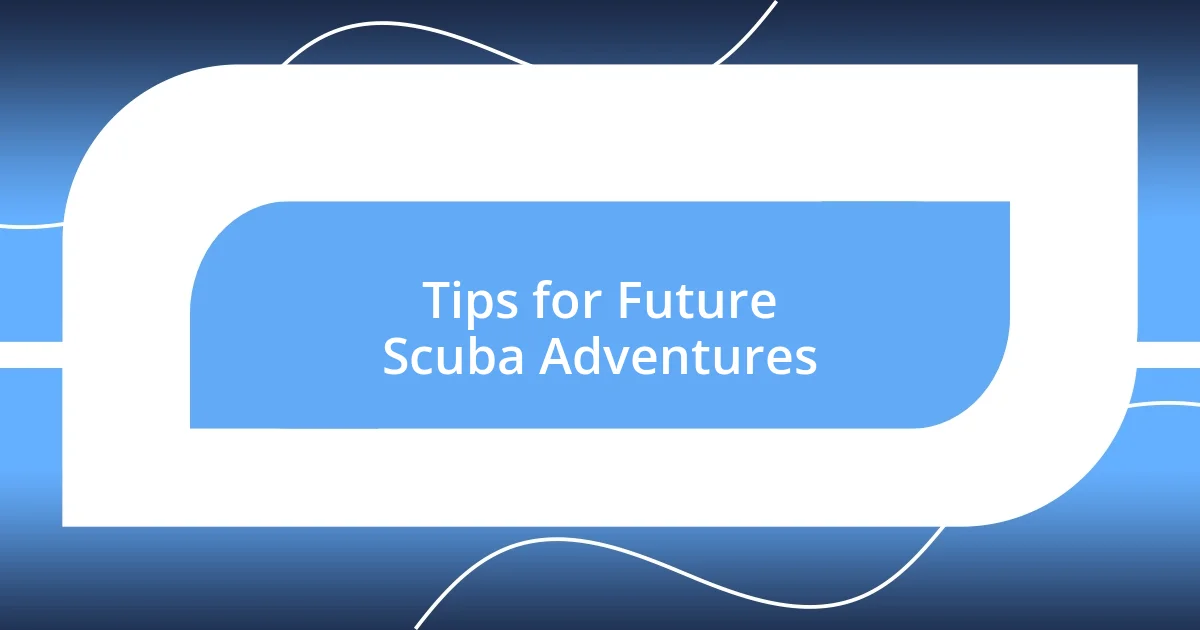
Tips for Future Scuba Adventures
One of the best tips I can offer for future scuba adventures is to always check your gear before diving. There was a day not too long ago when I was eager to jump in the water and didn’t do a thorough check. Halfway down, I realized my regulator wasn’t functioning properly. That little oversight turned a joyful experience into a lesson learned the hard way. Making it a habit to run through a checklist not only ensures safety but also helps you relax before the dive.
Communication with your dive buddy is another essential aspect I can’t stress enough. I learned this during a dive when I found myself completely enthralled by a passing school of fish and lost track of my buddy. When I finally turned around, I saw them signaling me with a look of concern. It was a reminder that staying connected in those mesmerizing moments can make all the difference. I now make it a practice to frequently check in and share my experience, ensuring that we both feel comfortable and engaged.
Lastly, don’t underestimate the importance of being mentally prepared for your dive. I remember a dive that had me feeling nervous due to poor visibility; my mind was racing with all the ‘what-ifs’. I took a moment to recall my training and focus on my breath, which transformed my anxiety into excitement. If you find yourself struggling with nerves, ask yourself: What are you truly afraid of? Often, by addressing those fears head-on and visualizing positive outcomes, you can shift your perspective and fully enjoy the underwater wonderland awaiting you.












